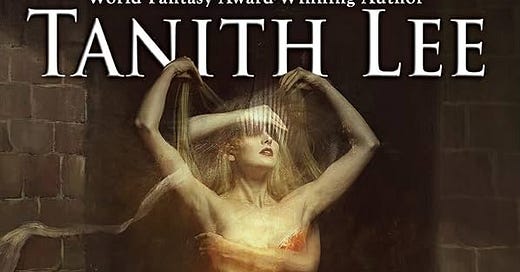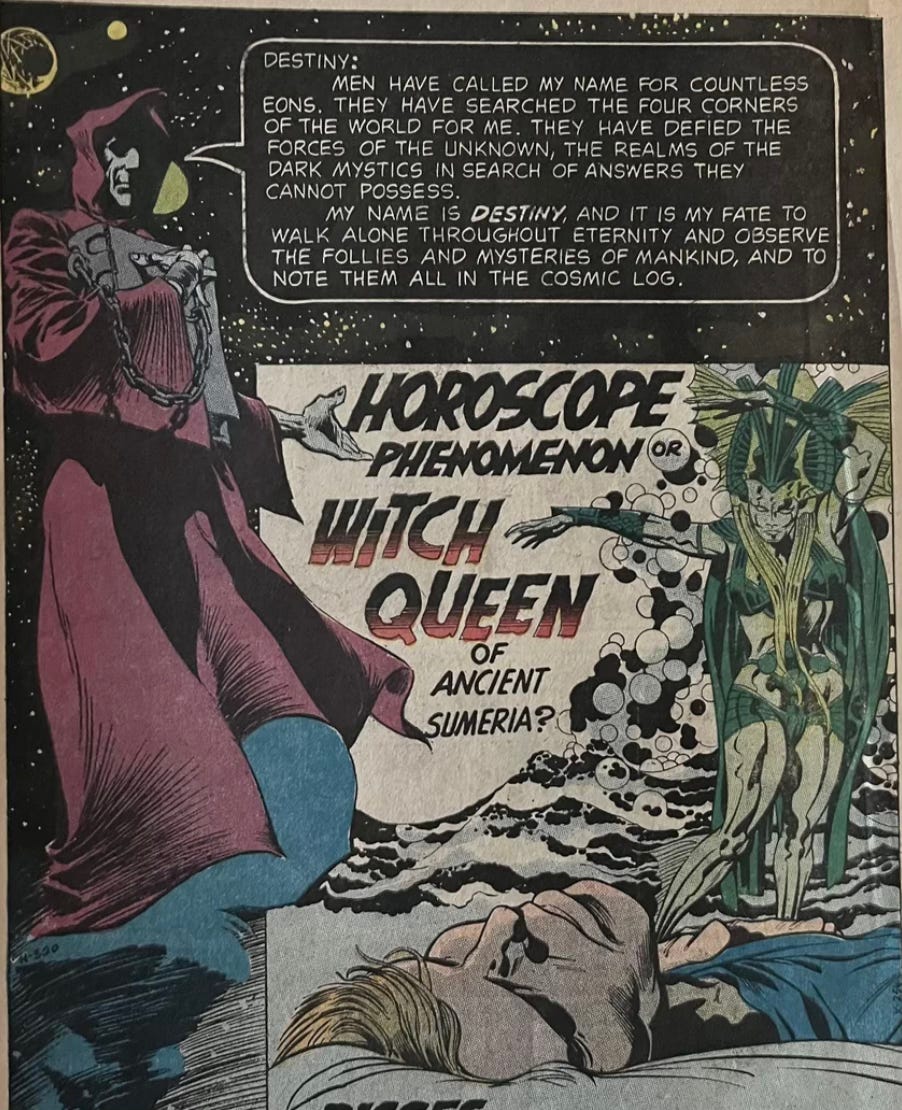“In the lyre-land, string and chord
Bring me music in a word
Bring me magic in a look:
For your eyes are like a sword.
And your smile is like a bird
Singing from an ancient book…”
-Delerium’s Mistress by Tanith Lee
Women are profoundly given to delusion. You can be mad at me all you like for saying it but the only people who truly disagree in their heart of hearts are Gamma Males. Ironic since they above all benefit from it on the rare occasions it is used to pretend they are something they aren’t. Yet women are also incisive judges of character, much more so than men can ever be.
Tanith Lee was right to have made one of her most layered woman protagonist the lover of the Prince Madness.
Delirium’s Mistress is an intriguing deviation from the structure of her previous Flat Earth books. This one is a biography. It follows the course of life of Azhriaz, daughter of Night’s Master, Azrahrn the Prince of Demons. This is the first book that doesn’t make a close examination of one of the Lords of Darkness. The first three featured the Master of Night, the Master of Death, and the Master of Madness (insofar as Madness has a master). If the series had held to form, this one would have focused on the labors of King Fate.
Indicating to me that Tanith Lee either found life of Azrarhn’s daughter too fascinating to put off for another moment, or Fate’s life was too fundamentally boring to build a story around, or she had wearied of following the same formula after three books. Possibly all three.
Regardless, the novel traces the footprints that the life of Azhriaz, child of Dunazel and Azrarhn, left behind her. Throughout the book she changes her name repeatedly depending on which phase of her life is being recounted, so for the sake of what clarity is possible in covering a Tanith Lee book I will be referring to her as “Azhriaz” even though that is only really appropriate for one period of her life.
Azhrarn claimed he had no love for his daughter, only a use. His vast pride had been deeply wounded when he discovered how his self-sacrifice to save Flat Earth had been altered by men into a myth where he was the villain of the story and it was the gods that had saved the world. Azhrarn had in fact, had built a ship that could sail to Upper Earth where he had berated the gods to take action to save man. The gods didn’t care, they regarded man as a mistake that they no longer had any interest in. And so, in an act of pure selfless love, Azhrarn the Prince of Demons had allowed himself to be burned to death in the sunlight to destroy a perfect and all powerful hate.
Giving credit to and giving praise unto the unfeeling gods for his sacrifice was intolerable to Azhrarn. His daughter was to be made a goddess on Flat Earth who would show man just how little the gods cared for man.
Azhriaz was raised in his city of Druhim Vanashta within Underearth. He had her attended to but never looked at her himself, claiming he had no love for her, only ownership. The prince of madness, Chuz found a way into his unbrother’s city and stole Azhriaz away. They became lovers. This was her youth, she had never known love until then but now did.
Her youth ended when Azhrarn caught up with them. To make peace with the prince of demons, Chuz accepts whatever punishment Azhrarn lays on him. Which is that Prince Madness must spend the duration of one mortal life time as one of his own subjects. And so Chuz ran off mad into the world, leaving Azhriaz abandoned yet again.
After a few side adventures that left her a complete nihilist, Azhriaz agrees to become what her unloving father always wanted to be. Dreadful and terrible goddess on Earth. Her power covered the world and her priesthood preached only of how the gods cared nothing for them. All did love her and despaired.
The gods of Flat Earth did indeed care nothing at all for the doings of Man. Except for one thing. One thing only could prod them into the minimum effort necessary to destroy cities and turn day to night with the smoke of a world burning.
Hubris.
And so the gods of Flat Earth declared war on Azhriaz. While Azhrarn continued to claim he cared nothing for his child, his actions said otherwise. He fought with the angels that had been sent to destroy her while she was sent to the depths of the ocean in a special ship he had created for her, while Azhrarn fought the angels to his near destruction.
At the end of her adventures, Azhriaz was delivered to the state of a seven-year-old child and she finally found one that would act as her father. The sorcerer Zeriak from Death’s Master had gone through a prolonged change himself and adopted her. It was a happy time for them, but eventually she had to grow up.
Eventually Azhriaz found a way to give up her immortal demon half and lived the span of a mortal life. Her father came to her in wrath at the end of her life. While it’s never said explicitly. He was angry with her because he loved her and she had chosen to die as a mortal.
Tanith Lee had an amazing affinity for the shape of words. She had an innate ability to understand how the sounds of a word could make you feel in a near vulgar sense. Let us take a well-known profanity. It starts with a soft sibilant “fff” sound, lower lip pressed to upper lip in near hiss, that melts into a gutteral “uh” sound coming from deep within the diaphragm. And finally ending with a hard “KK” sound which universally denotes disgust. All that in a one syllable word.
Her work is filled with examples of her mastery of this. For example, when the kind acolyte “Zerium” turns into the evil sorcerer “Zerak.” The last sound of his name shifts from a gentle mmm sound to a hard KK. It’s the gift of a true poet. She used her gift extensively in this work. Each name Azhriaz carries through out her life is a poetic expression of that stage. From innocent to maiden, to demon-goddess to wise matriarch.
Azhriaz changes the relationship the Lords of Darkness carry with each other. She becomes a center where they join. And while they have always had a relationship with each other that was both distant and close, Azhriaz turned them into family or at least an unfamily.
Bringing us once more to the Bangkok Rolex of Tanith Lee’s world, Neil Gaiman. Let look at King Fate’s stand-in, Destiny of the Endless. Destiny is eternally chained to his book, wherein everything that shall ever be is written; this is an unusually good representation of Fate. His burden and his purpose was well presented in this image, which suggests the more traditional personification of death and its inevitability. It’s rather brilliant in both its mythic license and poetic form of something that can not be evaded or defeated.
You’re probably left wondering how did Neil Gaiman come up with such powerful narrative imagery.
He didn’t.
Jack Kirby did.
Gaiman just repurposed someone else’s creation because that’s how he always “created.”
Delirium’s Mistress took the series into a realm of storytelling quite different from the rest of the series. While it does explore fate and the struggle of avoiding the inevitable. It wasn’t all predestination. The sunken city of Simurad was destined to be sunken beneath the waves for all time, its utter destruction broke the wheel it was bound to, the souls trapped therein at least had the option of pursuing reincarnation if not a proper afterlife. I suspect that means I’ll be running into Dunezel’s daughter in the next book in the series. A life begins with birth without dignity, a span of life all too brief, no matter how long it is, and then a death which never has dignity either. It is your fate to live this way but how you live your fated life is up to you.
Discuss in the Comments Below







Your insights into Lee’s saga are as always much appreciated. The talk of how language can be leveraged for optimal emotional effect in particular gives me much to think about regarding my own reading & writing. Mayhaps as a denouement after this series is concluded you might do a dedicated breakdown of the shortcomings of Gaiman’s pastiches and how he got away with each plagiarism? Because I’m curious how he was allowed to steal so openly from Jack Kirby of all people, and I’d like to see you rip into Despair and Desire even if they don’t have a superior iteration in Flat Earth.
Wonderful analysis. I’ll have to read some of Tanith Lee’s work after reading this.